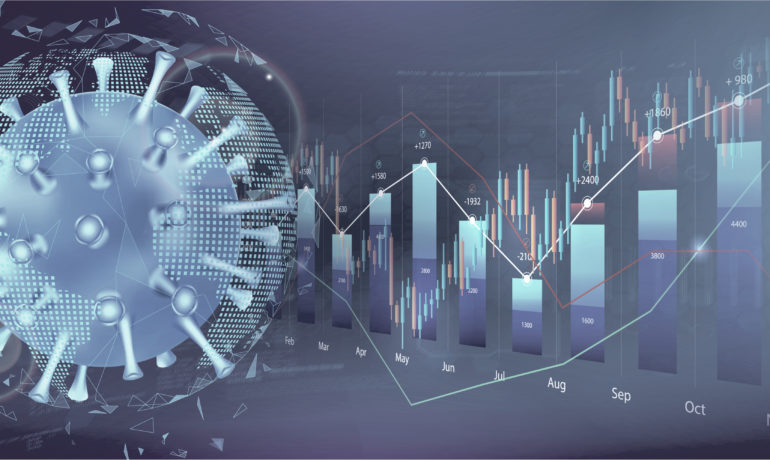The S&P 500 Index returned -19.60% and the S&P Global Broad Market Index returned -22.33% in the quarter ended March 31, 2020.[1]
In our last letter, after explaining why long-term global growth has been so strong (rising from $3 trillion in 1900 to over $100 trillion in 2015) and why we believe this growth will continue many years into the future, we wrote:
However, while we’re confident that global economic activity and wealth will rise over time, we’re even more confident that the world’s growth path won’t always be smooth. There will be periods of stagnation, recession, and even depression. The problem is, neither we nor anyone else, for that matter, can predict when these bumps in the road will occur.
While we didn’t know it at the time, we were just about to get a very salient and trying object lesson proving this point. The coronavirus pandemic with which we’re now all dealing was a true black swan event that has created both a global health crisis and a global economic crisis. Unfortunately, how bad each of these will get is, as always, anyone’s guess. As a result, many of us are experiencing anxiety and fear about a whole host of issues, including everything from the health of our families and friends to our own economic security. In this letter, we’ll provide some thoughts on how we’re managing our operations and your portfolios through this difficult time.
YCG Business Continuity
At YCG, we are taking precautions to minimize risk to our employees, clients, and operations. We continue to review our policies and procedures with the aim of strengthening our COVID-19 response to further align with updated public health advice and guidelines, including that of the U.S. Centers for Disease Control (“CDC”) and World Health Organization (“WHO”). As a result, we have temporarily suspended all travel to clients until it is again deemed safe to do so. We will continue to utilize conference calls, emails, and video conferences to provide our services.
We also want to let you know that YCG has in place business continuity systems for continued operations during this time, and we have taken steps to help minimize the potential impact of the virus on our employees, clients and operations, including the following:
- Testing of all Employees’ VPN Systems allowing remote work
- Testing of Call Forwarding Systems
- Confirmation of 24/7 Off-Site IT Systems Monitoring
- Server and Cloud Back-Ups
- Communications with our Broker-Dealers and Custodians on Liquidity Monitoring
The continual delivery of essential services to our clients is the focus of our strategic planning, and we can confirm that YCG continues to operate and to serve our clients at the highest service levels achievable within the scope of the incident with limited to no interruption.
Your Portfolio and Our Investment Strategy
As we mentioned at the start of this letter, we have always recognized that there will be inevitable but unpredictable bumps in the road from time to time. As a result, we constructed a portfolio for you that we believe can participate in the upside of long-term growth while also performing well on the downside and getting us all through times like these. Your portfolio is made up of a diverse collection of global champions with enduring pricing power and conservative balance sheets. The businesses you own are among the strongest and most conservatively capitalized businesses in their respective industries, and thus we believe they are also the most likely to be able to survive the current crisis and its resulting economic fallout.
Turning Lemons into Lemonade
In fact, as a result of the way we’ve structured your portfolio, we believe time periods such as this one can actually be positive in at least two ways:
First, because they are so strong going into the crisis, many of our businesses actually use downturns to strengthen their market position by continuing to grow while others are shrinking. In some cases, they are even able to buy distressed competitors at fire-sale prices. Thus, counterintuitively, recessions sometimes improve the long-run performance of the businesses we own.
Moreover, because investors tend to prefer their relative safety during downturns, our business’s stock prices tend to hold up better than their competitors, making it easier for us to act from a position of strength during difficult times. Thus, we can sell securities that have held up relatively well and reallocate into businesses where the stock price has been unduly driven down, thereby potentially increasing the forward rate of return. Ironically, this process of buying into bargains can potentially allow us to enhance overall portfolio returns from where they would have been had the crash never occurred. This is why some have said, “You make your money during a bear market, you just don’t know it at the time.”
To be clear, we are not buying into something just because it is getting cheaper. We want to have a sufficient level of comfort that the businesses we own can endure a severe recession. With this in mind, we generally avoid energy, airline, cruise line, and hotel companies, for example, because the amount of leverage that these businesses require, combined with their steep revenue declines, could force bankruptcy or extreme equity dilution that effectively wipes out existing shareholders.
Stock Prices vs. Business Value
However, even if we’re correct in our assessment that the businesses we own can make it through the crisis, it’s still possible they and/or the market will continue to decline.
If this outcome ends up transpiring, we think it’s important to remember that stock prices do not dictate the value of a business. For a moment, let’s pretend you are a tax accountant who owns your own business. How do you determine if you’re making money? You do it by looking at how much your business earns – you look at your income for the year. Suppose someone knocked on your door and said, “Hey, did you know I was willing to buy your business for $1 million one month ago, but today I’d only pay you $600,000.” Would this business owner panic and say, “Oh no! I’ve lost so much money I should end my tax career and sell my business to you.” No, in fact, even if you were to earn less money this year, interestingly, you would still view yourself as making money! And yet, investors tend to think of dropping stock prices (the guy knocking on their door offering a lower sale price) as indicating to them that they are losing money. But that’s only true if you need to sell your business today. You still own your shares of stock, and you are still making money in the companies you own.
However, given that the coronavirus could cause a very deep recession, you may be wondering, “But what if the businesses we own actually lose money this year?” Importantly, the value of a business is the stream of cash flows it produces far into the future. Formulaically, next year’s cash flows might only represent 5% of the overall business value. Thus, if a business earned zero next year and continued onward thereafter, one would expect stock prices would drop 5%. When the S&P 500 was down approximately 30% year-to-date at the lows on March 23rd, this simple and rough analysis suggests that markets were priced as though business activity would cease for 6-8 years. Of course, in 2019, the S&P 500 was up over 30% even though earnings results for the companies that make up the index were flat year-over-year. Clearly, business values are not gyrating as wildly as their stock prices would indicate. This is why Warren Buffet’s mentor, Benjamin Graham, advised, “Man would be better off if his stocks had no market quotation at all, for he would then be spared the mental anguish caused him by other persons’ mistakes of judgment” (The Intelligent Investor, 1973, p. 107). Further, he suggested that investors should view the market as a manic-depressive person named Mr. Market. By personifying the market in this way, he hoped to give investors a salient image that would allow them to view market gyrations with more equanimity. Using this framework, we can see that these gyrations are actually favorable to the long-term investors. While speculators are “instructed” by the market as to what the value of a stock should be, investors are “served” by the market which conveniently offers them attractive buying and selling opportunities.
This metaphor of Mr. Market also helps to explain why neither we nor anyone else can predict whether or not the market has bottomed. Mr. Market’s tirades could lead to much more substantial declines from the lows reached on March 23rd. From a valuation perspective, if the market dropped 40% from the lows, it would be in line with valuations during the bottom of the Great Recession (2008-2009). If it dropped another 75% from here, it would be in line with the bottom of the Great Depression (1929-1933). The latter outcome would be a dire scenario where nobody can make debt payments and the economy freezes up (like an engine without oil) leading to a credit crisis and skyrocketing unemployment. On the other hand, Mr. Market’s mood, which has steadily improved since March 23rd, could continue to brighten. Perhaps quarantine and better testing efforts will cause confirmed cases of COVID-19 to peak soon, or perhaps newfound treatments will reduce the severity and aid in recovery, or perhaps the virus slows down in the summer heat, or perhaps a vaccine is developed and distributed far quicker than anticipated, or perhaps the multi-trillion dollar stimulus packages from the government and its willingness to do “whatever it takes” are sufficient to stabilize and provide life support to the economy until it comes out of its coma.
Either way, predicting Mr. Market’s mood is not a successful strategy in our opinion. Not only do you need to accurately predict future events at a time of unprecedented uncertainty, but you have to predict how much of your predictions are already baked into market prices, thus “anticipating what average opinion expects the average opinion to be.” (John Maynard Keynes) Empirical evidence would suggest the best route is not to panic but rather to stick with your strategy and game plan for the long-term. It’s simply too unpredictable to try and time things. There’s never an announcement that says, “We’ve reached the bottom, time to get back in.” On average, when investors continually try to exit the market every time a risk appears and buy back when the market appears to have stabilized, they end up worse off than had they just remained invested.
Long-term outlook
Therefore, since we can’t predict the short-term, the key question is whether the companies we all own will prove to be good investments from these prices in the years to come. We believe they will. First, we are confident in humanity’s ability, through innovation and cooperation, to be able to face daunting challenges and to come through on the other side. Humanity has made it through incredible crises in the past, and we believe we will do it again. In fact, we believe the future is actually quite bright! With 60% (and rising) of the world now tapped into the cumulative knowledge of the world through the internet, we think future idea-sharing, innovation, and wealth growth are virtually assured. Second, we are confident that the “Global Champion” businesses in your portfolio will continue to act as toll takers on this rise in global wealth for many years to come.
Concluding Thoughts
Through all the panic and commotion over the past quarter, we continue to remain steadfast in our investment approach. It has served us well in previous turbulent times, and we are confident it will do so again. In fact, in many ways, we designed our investment strategy specifically for difficult periods like this one. We own a diverse collection of global champions with enduring pricing power and conservative balance sheets that, in our opinion, will likely emerge from this period in even stronger market positions. Furthermore, the strength and diversity of our portfolio companies has enabled us to confidently and opportunistically add to existing holdings as well as to purchase a few new holdings that we believe fit our criteria. Thus, while we don’t know what the stock market will do in the short-run, we continue to believe that our portfolio is positioned to produce attractive returns in the years ahead.
As always, should you have any questions or need assistance, please do not hesitate to call or email us. Please contact Will Kruger at [email protected] or text him at (512) 653-2095 to setup a time to talk via phone or video conference. Thank you for your trust and confidence in YCG. Lastly, and most importantly, our greatest wish and hope is that you and your families are safe and healthy as our nation continues to grapple with the effects of COVID-19.
YCG, LLC has recently filed its Annual Update to Form ADV. We made some changes to more accurately reflect how we describe our philosophy. There were no other material changes, but we would like to advise you that you may request a full copy of the most recent ADV Part 2A, at no charge, by contacting us or by accessing it at www.adviserinfo.sec.gov.
Sincerely,
The YCG Team
Disclaimer: The specific securities identified and discussed should not be considered a recommendation to purchase or sell any particular security nor were they selected based on profitability. Rather, this commentary is presented solely for the purpose of illustrating YCG’s investment approach. These commentaries contain our views and opinions at the time such commentaries were written and are subject to change thereafter. The securities discussed do not necessarily reflect current recommendations nor do they represent an account’s entire portfolio and, in the aggregate, may represent only a small percentage of an account’s portfolio holdings. A complete list of all securities recommended for the immediately preceding year is available upon request. These commentaries may include “forward looking statements” which may or may not be accurate in the long-term. It should not be assumed that any of the securities transactions or holdings discussed were or will prove to be profitable. S&P stands for Standard & Poor’s. All S&P data is provided “as is.” In no event, shall S&P, its affiliates or any S&P data provider have any liability of any kind in connection with the S&P data. MSCI stands for Morgan Stanley Capital International. All MSCI data is provided “as is.” In no event, shall MSCI, its affiliates or any MSCI data provider have any liability of any kind in connection with the MSCI data. Past performance is no guarantee of future results.
[1] For information on the performance of our separate account composite strategies, please visit www.ycginvestments.com/performance. For information about your specific account performance, please contact us at (512) 505-2347 or email [email protected]. All returns are in USD unless otherwise stated.




